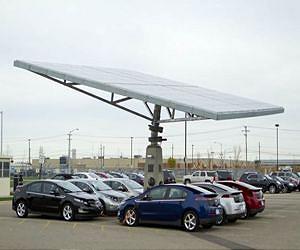Tossing worn-out solar panels into landfills may soon become electronics waste history.
Designing a recycling strategy for a new, forthcoming generation of photovoltaic solar cells – made from metal halide perovskites, a family of crystalline materials with structures like the natural mineral calcium titanate – will add a stronger dose of environmental friendliness to a green industry, according to Cornell University-led research published June 24 in Nature Sustainability.
The paper shows substantial benefits to recycling perovskite solar panels, though they are still in the commercial development stage, said Fengqi You, the Roxanne E. and Michael J. Zak Professor in Energy Systems Engineering in the College of Engineering.
“When perovskite solar panels reach the end of their useful life, how do we deal with this kind of electronic waste?” said You, also a faculty fellow at the Cornell Atkinson Center for Sustainability. “It is a new class of materials. By properly recycling it, we could potentially reduce its already low carbon footprint.
“As scientists design solar cells, they look at performance,” You said. “They seek to know energy conversion efficiency and stability, and often neglect designing for recycling.”
Last year, You and his laboratory found that photovoltaic wafers in solar panels containing all-perovskite structures outperform photovoltaic cells made from state-of-the-art crystalline silicon, and the perovskite-silicon tandem – with cells stacked like pancakes to better absorb light – perform exceptionally well.
Perovskite photovoltaic wafers offer a faster return on the initial energy investment than silicon-based solar panels because all-perovskite solar cells consume less energy in the manufacturing process.
Recycling them enhances their sustainability, as the recycled perovskite solar cells could bring 72.6% lower primary energy consumption and a 71.2% reduction in carbon footprint, according to the paper, “Life Cycle Assessment of Recycling Strategies for Perovskite Photovoltaic Modules,” co-authored by Xueyu Tian, a doctoral student at Cornell Systems Engineering, and Samuel D. Stranks of the University of Cambridge.
“Lowering the energy needed to produce the cells indicates a significant reduction of energy payback and greenhouse gas emissions,” said Tian.
The best recycled perovskite cell architecture could see an energy payback time of about one month, with a carbon footprint as low as 13.4 grams of carbon dioxide equivalent output per kilowatt hour of electricity produced. Without recycling, the energy payback time and carbon footprint of new perovskite solar cells show a range of 70 days to 13 months, and 27.5 to 158.0 grams of carbon dioxide equivalent throughout their life cycles.
Today’s market-leading silicon photovoltaic cells can expect an energy payback period of 1.3 to 2.4 years, with an initial carbon footprint between 22.1 and 38.1 grams of carbon dioxide equivalent emissions per kilowatt hour output.
“Recycling makes perovskites outcompete all other rivals,” Tian said.
Informed state and federal policies, along with recycling infrastructure development strategies, can further mitigate the environmental impacts in making photovoltaic solar cells.
Said You: “The real value of an effective green perovskite solar panel industry may rely on a recycling program.”
Related Links
Cornell University
All About Solar Energy at SolarDaily.com
|
We need your help. The SpaceDaily news network continues to grow but revenues have never been harder to maintain. With the rise of Ad Blockers, and Facebook – our traditional revenue sources via quality network advertising continues to decline. And unlike so many other news sites, we don’t have a paywall – with those annoying usernames and passwords. Our news coverage takes time and effort to publish 365 days a year. If you find our news sites informative and useful then please consider becoming a regular supporter or for now make a one off contribution. |
||
|
SpaceDaily Contributor $5 Billed Once credit card or paypal |
SpaceDaily Monthly Supporter $5 Billed Monthly paypal only |
|

![]()
Envision: China’s renewable energy giant
Beijing (AFP) July 2, 2021
Plans were announced this week for two new electric car battery plants in France and Britain involving Envision, the Shanghai-based company that has quietly built a global renewable energy empire.
Envision’s two billion euro ($2.4 billion) electric car battery plant in Douai, northern France, will supply French carmaker Renault, it said, becoming France’s second so-called “gigafactory”.
Carmaker Nissan – Renault’s Japanese partner – also said Thursday that it will invest 1 billion pounds … read more
